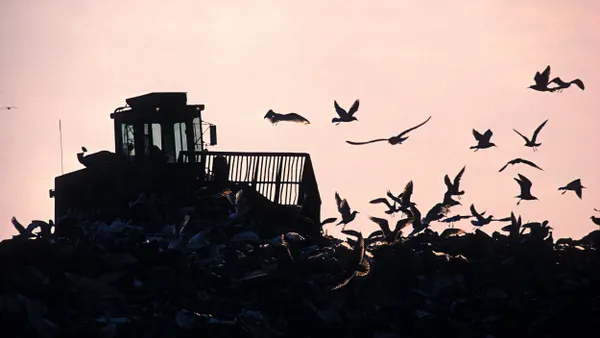Dive Brief:
- Vermont's Universal Recycling Law will ban the disposal of all organic material in landfills by July 2020, but some are questioning its feasibility. State legislation has been introduced to remove the mandate, as well as a requirement for all haulers to offer organics collection, as reported by Vermont Public Radio.
- The hauler mandate has already been extended by a year, and is now set to take effect in July 2018. State Senator John Rodgers, who introduced two bills to alter the recycling law, says requiring companies to get into the organics business amounts to government overreach.
- The other key point of contention is whether residential diversion — and collection — should be required. Diversion is already mandated for commercial establishments that generate at least 18 tons of organics per year. Expanding that mandate to cover everyone in Vermont, even the most rural residents, is seen as a costly move.
Dive Insight:
This discussion started by the Vermont Senate's Committee on Natural Resources and Energy has already drawn a broad array of opinions through testimony. The Vermont League of Cities and Towns sees the mandate as too expensive for municipalities. The Vermont Public Interest Research Group says it's the only way to ensure environmental progress. The Solid Waste District Association says it's all very locally specific.
Rodgers' bills also include additional language, such as a proposal to remove glass from the list of mandated recyclables, that will make negotiations even more complex in the coming weeks.
Further complicating this discussion is the fact that some service providers and processors have already made the necessary investments. They say turning back, or easing the mandate, could put them at a competitive disadvantage.
Yet some companies that made investments have also expressed support for reevaluating the Universal Recycling Law. John Casella, CEO of Vermont-based Casella Waste Systems, has said on multiple occasions he feels implementation is moving too fast.
In defense of the law, Vermont's Department of Environmental Conservation has pointed to a reduction in waste disposal, increased diversion and higher food recovery rates as a sign of its success. As for rural route density, the DEC has proposed drop-off sites as a solution. While the disposal ban on curbside recyclables has also posed its own challenges, the organics mandate has been more high-profile.
By setting one of the most stringent organics diversion goals in the country, Vermont was bound to encounter ongoing questions leading up to 2020. Even in some of the more successful states, such as California and Massachusetts, it has taken time to scale up processing capacity. As seen at the state level in New York, where efforts to enact a commercial mandate have so far been unsuccessful, these cost concerns remain a key factor ahead of any implementation.
If Vermont can find a way to keep its 2020 goal intact, while proving that a universal mandate can work even in the most rural areas, it could be a model for every other state to follow. If not, it could become a cautionary tale that discourages other states from being similarly ambitious.











